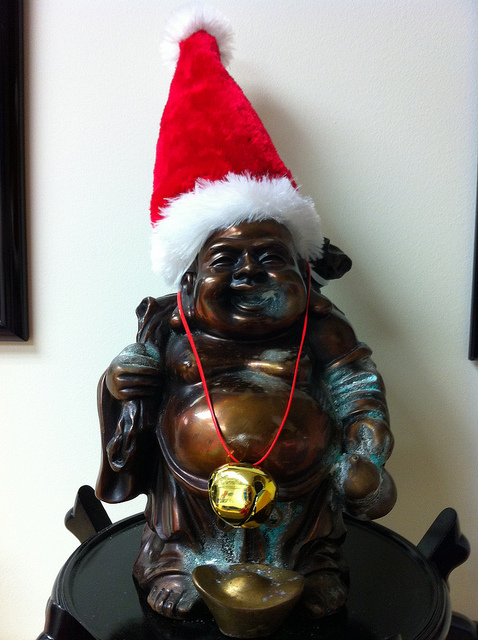
“My religion is very simple. My religion is kindness.” ~ Dalai Lama
When I was a kid, Christmas meant presents.
Maybe this is because in the month prior to the holidays we spend so much time talking about presents. Even thinking about gifts below the tree was enough to thrill me for days.
As I grew up, Christmas started meaning more for me. It extended from giving and receiving presents, to putting up decorations and sharing delicious, diverse food. And of course, food on Christmas always tasted better with my family around me.
I loved the Christmas messages I received at midnight and would memorize who wished me happy holidays, so I could remember to do the same.
Looking back, I was selfish in one way or another during Christmas: waiting for my gifts, waiting to have mouth-watering food, waiting for God to grant my wishes, and waiting to see who would remember me.
It wasn’t until two years ago that my perception of Christmas began to change.
Thanks to Buddhism, I’ve learned more about the real spirit of Christmas. This doesn’t mean that the way I celebrated Christmas before was wrong—it’s actually how most of us do Christmas. It’s absolutely cheerful to give and receive presents and to share happiness with our family.
What I do consider wrong now is how I perceived kindness on Christmas. I thought being kind to myself and to my family was enough. Christmas was my excuse to be kind, so I defined kindness as buying gifts and clinking wine glasses.
In other words, I fit kindness into a box called “Christmas.”
Since Buddhism was why I changed my perception of Christmas (and why I’m spending it differently this year), I wondered how the Buddha would have spent Christmas.
The following are my thoughts on this:
Buddha would’ve given presents to other people, too.
We primarily focus on getting presents for our family and friends on Christmas. The truth is, there are many people out there who lack basic necessities. It is of benefit to think of them the same way we’d think of the people with whom we live. We can visit charities or find families that are in need.
Small gifts sometimes have great significance. When I was in India, I spent some time with a poor family that lived in a single room—they didn’t even have a kitchen. They invited me over for dinner one time and as I prepared food with the mother, I noticed she crushed the garlic on a plate with a bottle of glass. The next day, I got her a garlic press. It was only 80rps—which is equivalent to $1—but she almost cried when she saw it. It was exactly what she needed.
Buddha wouldn’t have been attached to the presents.
Although Buddha would have bought presents for people, he wouldn’t have been attached to them—and would’ve recognized their impermanent nature. On Christmas, we’re somewhat attached to the idea of gifts. We anxiously wait to open them—we’re happy if we like them and become disappointed if we don’t.
We should realize that presents are only transient things that bring us temporary happiness. We can still enjoy the moment when we buy and open presents, but we should remain aware that they’re not everlasting.
Buddha would’ve practiced compassion toward all living beings.
Again, being kind and compassionate should extend to all living beings—not only our family. Just like we would share food and drinks with our family, we can share with a poor stranger or with a stray dog on the street. Being compassionate and kind doesn’t require presents—it only requires love.
Sometimes, the greatest gift we can give another is our unconditional presence and affection. Being kind truly costs us nothing. Before thinking about the gifts, we should think of how we can be kind. What’s the point of getting people precious presents on Christmas, when on other days we judge them, don’t listen to them and don’t support them.
Buddha would’ve read between the lines.
Christmas is the celebration of Jesus coming to earth. However, we can also reflect on this and extract another deeper meaning that is of benefit to our spiritual progress. Birth isn’t only physical. In every moment, we have the choice to be reborn again.
Every day, we should die to the past, to the bad memories, to our old self, to judgments and our wrong perceptions of reality, and be born again as a new person. Through personal rebirth, we progress on the spiritual path and eradicate everything old within us.
Buddha wouldn’t have waited for Christmas to start being kind.
Although Buddha would have been extra kind on Christmas, he wouldn’t have waited for this one day to practice kindness and compassion. At times, we unconsciously link kindness with Christmas. Nevertheless, kindness knows no time. While we should certainly be kind on the Holidays, we shouldn’t forget to also be kind every other day.
It is of benefit to deem every day a holiday and act upon it, so be like the Buddha and make every day Christmas Day.
~
Author: Elyane Youssef
Image: Justin Mazza/Flickr
Editor: Nicole Cameron








Read 0 comments and reply